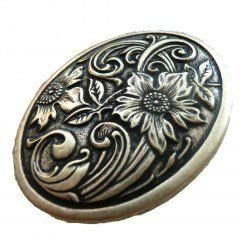
Yatagan
415 Reviews
Translated · Show original

Yatagan
Top Review
25
Anno Domini 1297
Uncommented Fragrance No. 28
You stroll through a medieval market, it is dark, you are appropriately dressed in medieval garments, immersing yourself in the feeling of having arrived in a time when our culture was still young.
You feel far removed from our opaque postmodern times, the wristwatches, the beeping smartphones, the advertising signs and sneakers fade from your mind. Straw lies on the streets, the gloomy alleys are illuminated by torches, laughter from taverns by the roadside echoes to you, in the distance, the music of traveling jesters can be heard.
...
Today is market day and as a simple carpenter of the 13th century, you can only direct your steps through the dirt and stench of the streets to the merchants' stalls after a long day of work.
You turn to the first stall that catches your attention. There is mead, you order a clay cup filled with the invigorating liquid from the pretty girl behind the stall, flirt a little, enjoy the scent of honey, and then continue on your way.
At the second stall stands a wealthy man haggling over the goods. As a simple carpenter, you cannot afford the expensive spices available there anyway. You smell cinnamon and pepper, perhaps some herbs you cannot distinguish and do not know. Disappointed by the high prices and your meager wallet, you continue your way through the alleys.
The third stall seems foreign and eerie to you. A dark-skinned merchant, who seems completely out of place in your village, is offering healing salves, which you ultimately want to take a closer look at. The old man at the stall is friendly, quickly gains your trust, and after realizing that you are not a wealthy customer, he offers you a small clay pot with a salve for a modest fee, promising that it will revive your love life. You can use that. By medieval standards, you are old, your wife is hardly younger, and for this, you are willing to sacrifice your longed-for wine in the tavern. Satisfied and a little poorer, you leave the merchant.
Now, a bit of guilt plagues you. You direct your steps to the church that stands in the village square. In the dim interior, barely illuminated by a candle, you breathe in the familiar scent of the holy: the last wisps of incense linger in the air. You already feel better, you feel calmer: a quick Our Father and you are back on the bustling streets.
It is now so dark that night has fallen. You are glad that the moon is in the sky, as the path to your house on the outskirts is not lit. Before you can make your way home, you stop as always at the barber's stall. Your toothache plagues you: the constant companion of medieval people. The barber has a remedy. For a small fee, he gives you a tincture that smells of myrrh. The pain eases a bit during your walk home. You will find sleep tonight.
Your journey and its scents come to an end: honey, cinnamon, spices, patchouli, incense, myrrh could combine in this fragrance, which smells warm, soft, slightly sweet, subtly oriental, and balsamic, and indeed immediately reminds me of the scents at a medieval market. It is available as a fragrance balm in a beautiful silver box that resembles a powder compact or a pocket watch. While some fragrances from Roxana are also offered as liquid perfumes, Terrestre is listed on Roxana's homepage only as a solid perfume.
Note: For those who wish to experience the above and immerse themselves in the Middle Ages, I recommend the medieval markets in Ebernburg (annually) or Oberwesel (every two years), which can give a bit of the impression of authenticity due to the backdrop of the surrounding places.
You stroll through a medieval market, it is dark, you are appropriately dressed in medieval garments, immersing yourself in the feeling of having arrived in a time when our culture was still young.
You feel far removed from our opaque postmodern times, the wristwatches, the beeping smartphones, the advertising signs and sneakers fade from your mind. Straw lies on the streets, the gloomy alleys are illuminated by torches, laughter from taverns by the roadside echoes to you, in the distance, the music of traveling jesters can be heard.
...
Today is market day and as a simple carpenter of the 13th century, you can only direct your steps through the dirt and stench of the streets to the merchants' stalls after a long day of work.
You turn to the first stall that catches your attention. There is mead, you order a clay cup filled with the invigorating liquid from the pretty girl behind the stall, flirt a little, enjoy the scent of honey, and then continue on your way.
At the second stall stands a wealthy man haggling over the goods. As a simple carpenter, you cannot afford the expensive spices available there anyway. You smell cinnamon and pepper, perhaps some herbs you cannot distinguish and do not know. Disappointed by the high prices and your meager wallet, you continue your way through the alleys.
The third stall seems foreign and eerie to you. A dark-skinned merchant, who seems completely out of place in your village, is offering healing salves, which you ultimately want to take a closer look at. The old man at the stall is friendly, quickly gains your trust, and after realizing that you are not a wealthy customer, he offers you a small clay pot with a salve for a modest fee, promising that it will revive your love life. You can use that. By medieval standards, you are old, your wife is hardly younger, and for this, you are willing to sacrifice your longed-for wine in the tavern. Satisfied and a little poorer, you leave the merchant.
Now, a bit of guilt plagues you. You direct your steps to the church that stands in the village square. In the dim interior, barely illuminated by a candle, you breathe in the familiar scent of the holy: the last wisps of incense linger in the air. You already feel better, you feel calmer: a quick Our Father and you are back on the bustling streets.
It is now so dark that night has fallen. You are glad that the moon is in the sky, as the path to your house on the outskirts is not lit. Before you can make your way home, you stop as always at the barber's stall. Your toothache plagues you: the constant companion of medieval people. The barber has a remedy. For a small fee, he gives you a tincture that smells of myrrh. The pain eases a bit during your walk home. You will find sleep tonight.
Your journey and its scents come to an end: honey, cinnamon, spices, patchouli, incense, myrrh could combine in this fragrance, which smells warm, soft, slightly sweet, subtly oriental, and balsamic, and indeed immediately reminds me of the scents at a medieval market. It is available as a fragrance balm in a beautiful silver box that resembles a powder compact or a pocket watch. While some fragrances from Roxana are also offered as liquid perfumes, Terrestre is listed on Roxana's homepage only as a solid perfume.
Note: For those who wish to experience the above and immerse themselves in the Middle Ages, I recommend the medieval markets in Ebernburg (annually) or Oberwesel (every two years), which can give a bit of the impression of authenticity due to the backdrop of the surrounding places.
19 Comments




 Frankincense
Frankincense Galbanum
Galbanum Indian rose
Indian rose Oud
Oud Patchouli
Patchouli Soil
Soil Vetiver
Vetiver First
First Bellemorte
Bellemorte Fluxit
Fluxit


















